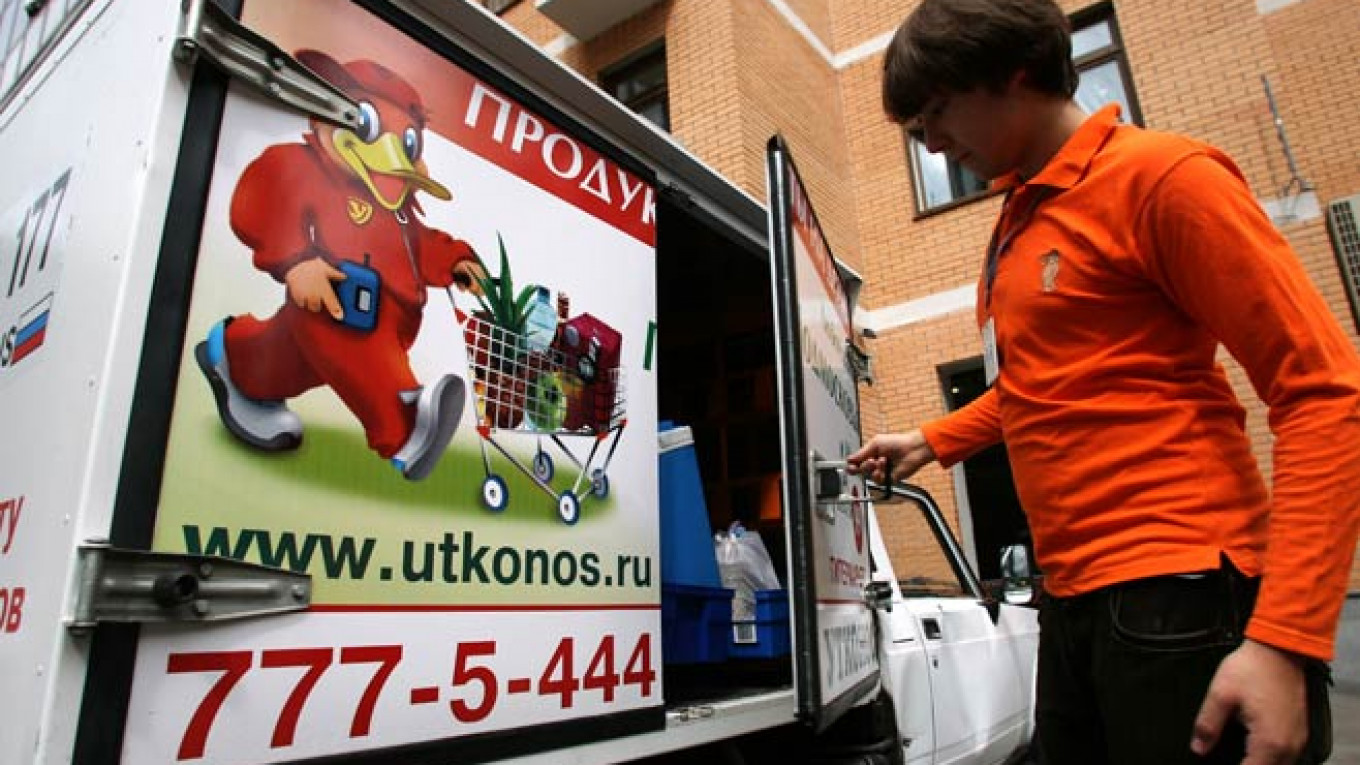The Russian government's campaign to crush counterfeit and after-hours liquor sales has turned digital, with all websites that sell alcohol online to be blocked if the State Duma passes proposed legislation.
The amendments to the law "On government regulation of the alcohol market" are aimed at counterfeiters and stores selling alcohol after the 11 p.m. cutoff, but the measures would affect all market players.
Among those in the line of fire are such large online hypermarkets as Utkonos, the 10th-largest online retailer in Russia with revenues of $200 million a year, according to Forbes.
An Utkonos spokesman told RBC that the sales ban will harm large legitimate retailers most of all without actually combatting the problem of after-hours sales. "Today they will block one store, but tomorrow it will continue operating with a new address. And so on to infinity. The largest players will suffer," she said. Alcohol deliveries are a significant source of revenue for Utkonos, although the company declined to provide further details.
Still, some small retailers are also particularly vulnerable to the new law. Alcohol shop Evino.ru will be forced to close down if the amendments are passed, co-owner Rinat Mukhamedzhanov told RBC. Although the company has a physical store, online sales are their main sales channel.
According to Viktor Zvagelsky, the Duma deputy who submitted the bill, up to 10 percent of all alcohol sold in Russia is purchased online. Analyst Vadim Drobiz, director of the Research Center for Federal and Regional Alcohol Markets, cited a rather different figure: no more than 1 percent is sold online, Drobiz said, although he added that online sales are a "growing trend."
The long-distance sale of alcoholic drinks was in fact banned in 2007, but online stores have found several ways to sidestep the law. One common strategy is to reserve a bottle at a physical retail store, which a courier then purchases at the store and delivers to the original buyer. Another is to offer customers alcohol as a "gift" given with the purchase of another product.
In addition to online sales, the amendments would ban selling alcoholic drinks via discounts or coupons, in combination with other goods and at any location not explicitly indicated in the sellers' license.
If passed, these amendments would become the latest in a wave of restrictions that have made the Russian alcohol market increasingly inhospitable to business over the past three years. Prices on products with an alcohol content higher than 9 percent have climbed steadily due to increasing excise duties, while advertising is now banned at all locations other than the point of sale. Laws last year also prohibited selling alcohol after 11 p.m. and selling beer at? street kiosks.
The government pledged in 2010 to cut the average Russian's alcohol intake 15 percent by? 2012 and? 55 percent by? 2020, partly through such economic measures as raising the excise duties on alcohol sales.
Excessive alcohol intake is the? primary cause of? premature deaths in? Russia, according to a study published in January by researchers from Oxford University, the Russian Cancer Center and? the World Health Organization International Agency for? Research on? Cancer. Over the course of 10 years, 8,000 of the 150,000 study participants perished from alcohol-related diseases, the study found.
Legal alcohol sales shrank 16.9 percent in the first three months this year as compared to 2013, a tendency seen across beverages, from wine to vodka to cognac. The illegal vodka market has swelled on the rising demand for cheaper products, Kommersant reported earlier this month.
Contact the author at [email protected]
A Message from The Moscow Times:
Dear readers,
We are facing unprecedented challenges. Russia's Prosecutor General's Office has designated The Moscow Times as an "undesirable" organization, criminalizing our work and putting our staff at risk of prosecution. This follows our earlier unjust labeling as a "foreign agent."
These actions are direct attempts to silence independent journalism in Russia. The authorities claim our work "discredits the decisions of the Russian leadership." We see things differently: we strive to provide accurate, unbiased reporting on Russia.
We, the journalists of The Moscow Times, refuse to be silenced. But to continue our work, we need your help.
Your support, no matter how small, makes a world of difference. If you can, please support us monthly starting from just $2. It's quick to set up, and every contribution makes a significant impact.
By supporting The Moscow Times, you're defending open, independent journalism in the face of repression. Thank you for standing with us.
Remind me later.


